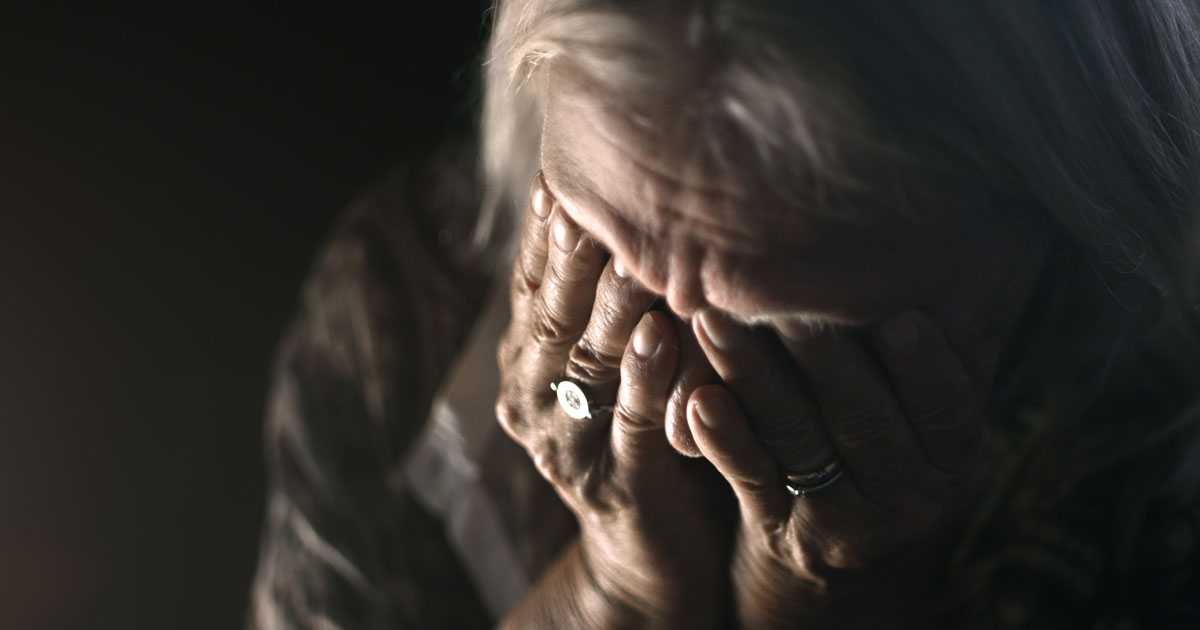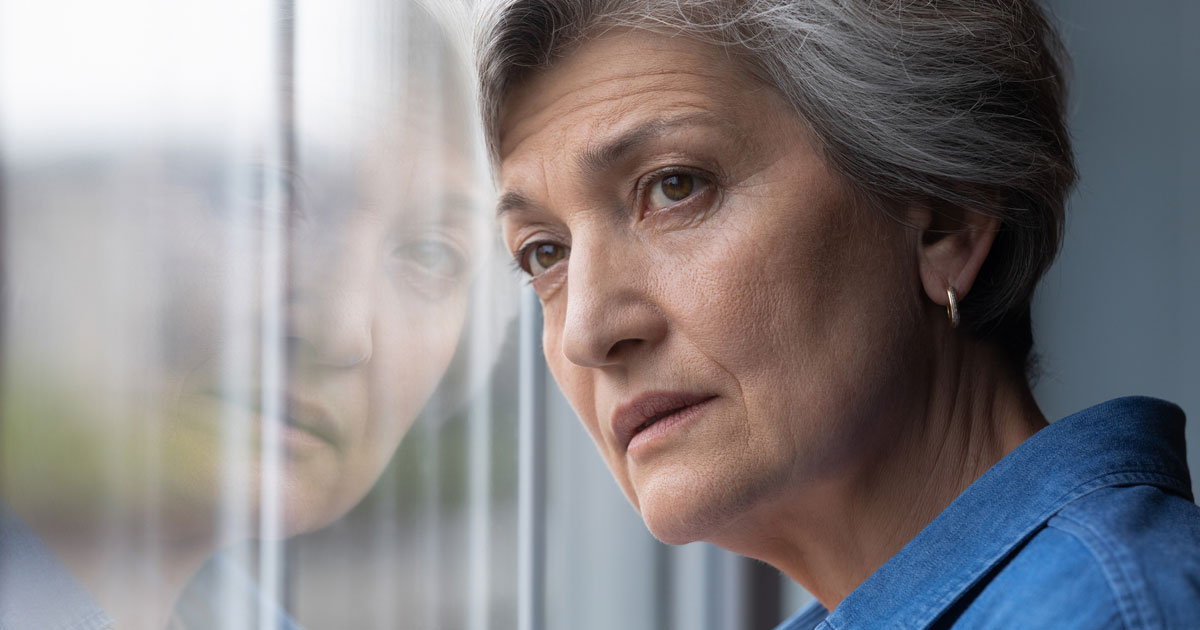
Depression is not a normal part of aging, but it affects 15% of people over the age of 65 at some point in their later lives. Different from short term changes in mood or temporary seasonal blues, geriatric depression can last for a sustained period of time, and it can have an impact on a person's ability to get through their day to day life.
Whether it has to do with mental disorders, cognitive impairment, a physical illness, or a family history of these types of issues with declining health, a depressed mood in older adults can have a negative impact on their overall health and quality of life. Knowing the diagnostic criteria for depression and seeking effective treatment can make an elderly patient's late life much more comfortable.
What Is Geriatric Depression?
Geriatric depression is a persistent mental health issue occurring in older adults that can interfere with normal functioning. Elderly patients often have a history of experiencing depression in the past, and it can also be triggered by an unrelated medical illness. Depression itself is a mental illness that must be diagnosed and treated by a licensed medical professional.
It can be difficult for older adults to recognize geriatric depression for a variety of reasons. They might have difficulty communicating what they are experiencing. Even if they do know how to talk about it, they might not be able to recognize that it has taken root. Furthermore, the majority of symptoms must be reported verbally — there is no set of diagnostic tests that can definitively determine whether or not an elderly patient is experiencing geriatric depression by examining, for example, blood samples.
It is also important to remember that elderly patients grew up in an era where depression was not well understood — it has not been recognized as a legitimate mental health issue until more recent decades. This can make older adults hesitant to report feelings of depression out of fear that they will be stigmatized or labelled "crazy."
Depressive Symptoms in Older Adults
If left untreated, geriatric depression can cause an existing medical illness to get worse, it can lead to disability, and it can also lead to a premature death — including death by suicide. That is why it is so important to be able to recognize the signs and symptoms of depression in older adults, as well as the risk factors that can lead to older adults developing late life depression.
Symptoms of geriatric depression include:
- Persistent feeling of tiredness
- Difficulty sleeping
- A grumpy or irritable attitude
- Feelings of confusion
- Difficulty paying attention
- Loss of interest in typically enjoyable activities
- Noticeably slower movement
- Crying spells
- A change in weight or appetite
- Feelings of guilt, worthlessness, or hopelessness
- Aches and pains
- Suicidal ideation
While many of these are commonly associated with other medical illnesses, depressive symptoms last for a long period of time, sometimes even becoming chronic. Risk factors that can lead to geriatric depression include:
- Extended periods of isolation
- A decline in independence and mobility
- Struggling with the transition into retirement
- Financial hardship
- Substance abuse
- Widowhood or divorce
- Grief following the deaths of friends and loved ones
- Enduring chronic conditions
- A history of depression
- Grappling with their own mortality
These types of challenges are very common among older adults, which helps to explain why so many of them develop depressive symptoms.

The Geriatric Depression Scale
To help with the diagnosis of geriatric depression, the Geriatric Depression Scale (GDS) was developed. The Geriatric Depression Scale is a 30-item questionnaire that assesses how elderly patients have been feeling over the past week. There is a shorter, 15-item questionnaire as well.
This tool has been rigorously tested, and responses correlate strongly with defined levels of geriatric depression ranging from normal (no depression) to severe. Although it is regarded as highly reliable, it is designed as a geriatric depression screening scale. Older adults with depressive symptoms should always consult a doctor if they are concerned that they might be experiencing geriatric depression so an official diagnosis can be recorded and proper treatment can begin.
How to Handle Major Depression
Even when depressive symptoms are reported early and a treatment plan is in place, major depression can still take hold. This can happen for a number of reasons. In some cases, geriatric depression further complicates other medical conditions, leading to a delayed recovery and increasing the pain and discomfort of day to day living. In others, grief and other emotional states contribute to an increasingly pessimistic point of view.
As these kinds of compounding situations add up, it is more likely that they will result in severe depression. Quality of life under major depression continues to decline and becomes a disruptive force that can feel permanent or impossible to overcome.
Mild forms of depression can be treated with certain lifestyle changes — like finding a new hobby, becoming more physically active, eating well, and spending more time with others. But if someone has a high score on the Geriatric Depression Scale, it could indicate that they have severe depression, and more advanced treatments ought to be considered. This may include the following:
- Prescription medication – Selective serotonin reuptake inhibitors (SSRIs), tricyclic antidepressant medication, monoamine oxidase inhibitors (MOIs), bupropion, and mirtazapine are all commonly administered to treat depression.
- Psychotherapy – Allows patients to thoroughly explore what they are experiencing so they can recognize it and develop skills that help them manage it.
- Electroconvulsive therapy – Helps change brain chemistry and can help treat major depression, especially with patients who are also experiencing psychosis, who refuse to eat, or who have suicidal ideation.
Mental Health in Older Adults
Declines in mental health are one of many health problems an elderly person can experience as they age. It is important for the symptoms of late life depression to be detected and reported early so they do not result in a chronic illness. Developing depression is common, but it does not have to be disruptive. Geriatric patients — whether they are experiencing physical pain or something more like a mood disorder — should seek treatment for both major and minor depression.
The Geriatric Depression Scale is a helpful tool in the fight for mental health against major depression. With the right support systems in place, older adults will be able to get the care they need to overcome late life depression.
Conclusion
Home health care is becoming more and more valuable with each passing year. As older adults retire and begin to experience declines in their physical or mental health, they can start to take advantage of health care services that help them to maintain their quality of life. Whether it is asking a doctor to evaluate them at their residence with the geriatric depression screening scale or making an appointment for a psychotherapist visit, health care is becoming more convenient and comfortable than ever.
Keystone Health is a trusted leader in home health care. We provide house calls and other important services to elderly patients in the greater Boise area. To learn more about how we can help you, your family, or someone you know, start our new patient process and get on track for a full recovery.
